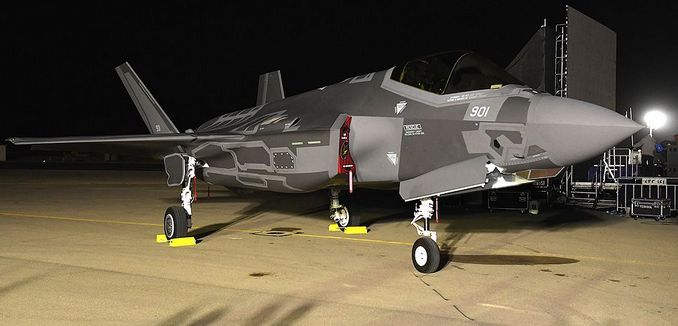The American defense contractor Lockheed Martin has bought more than $1 billion worth of equipment or services from Israeli subcontractors to build state-of-the-art F-35 fighter jets since 2010, the Israeli Ministry of Defense announced Sunday.
Avi Dadon, deputy director of purchasing for the Ministry of Defense, announced that Israeli companies had signed $258 million worth of contracts with Lockheed Martin for work on the F-35 during 2016. That amount represented an increase of 33 percent over the value of the contracts for 2015. (Israel announced in December 2015 that the total cumulative contracted work up to that point was valued at $770 million.)
Israel’s Elbit Systems, which co-developed the sensor-fused helmets for the plane with American contractor Rockwell Collins, received $206 million for its work. Cyclone and Tadiran, both subsidiaries of Elbit, won $20 million contracts for structural components and radio amplifiers, respectively. And the state-owned Israel Aerospace Industries received $26 million for its work on the wings.
According to Dadon, Lockheed specifically awarded contracts to companies based in northern Israel in order to give a boost to industries in the “line of confrontation” near the border with Lebanon.
He also expressed optimism that Israel and Lockheed could “further deepen” their cooperation in the coming year.
Israel received its first shipment of two F-35s in December.
The Israeli government is currently negotiating a third contract with Lockheed for 17 more F-35 fighters, which would bring Israel’s fleet to 50 when fully completed.
In an interview late last year with Defense News, Jack Crisler, Lockheed Martin’s vice president for F-35 business development, praised the Israeli technology that went into the F-35 pilot’s helmet, which he said gave the pilot “unprecedented revolutionary situational awareness.” Crisler called it a “revolutionary technology, it doesn’t exist anywhere else….all Israelis should be proud of that.”
Israel is the only nation allowed to make modifications to the F-35. Criswell also explained in the interview, embedded below, why Israel was able to get that authorization.
[Photo: U.S. Embassy Tel Aviv / WikiCommons ]




